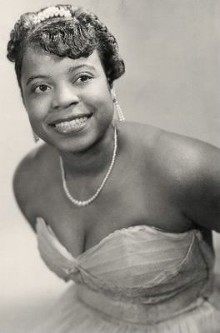Varetta Dillard
Varetta Dillard | |
|---|---|
 | |
| Background information | |
| Birth name | Varetta M. Dillard |
| Born | February 3, 1933 Harlem, New York City, United States |
| Died | October 4, 1993 (aged 60) Brooklyn, New York, United States |
| Genres | R&B |
| Occupation(s) | Singer |
| Years active | 1951 – early 1960s |
| Labels | Savoy Groove RCA Triumph Club |
Varetta Dillard (February 3, 1933 – October 4, 1993)[1] was an American rhythm and blues singer in the 1950s whose biggest hit was "Mercy, Mr. Percy".
Life and career[]
She was born in Harlem, New York, and spent much of her childhood in hospital due to a congenital bone condition.[1] By her mid-teens, her condition had stabilised, though she remained unable to walk without crutches or other assistance. She met Carl Feaster of doo-wop group The Chords, who encouraged her to enter talent contests as a singer, and in 1951 she won two consecutive competitions at the Apollo Theater.[1] She was signed by Savoy Records, and had her first recording session with the company in September 1951.[1] Although her early singles were commercially unsuccessful, she was invited by Alan Freed to perform at what later became recognised as the first major rock and roll concert: the Moondog Coronation Ball held in Cleveland, Ohio on March 21, 1952. Because of concerns over crowd safety, the concert was shut down by the authorities after the first song by Paul "Hucklebuck" Williams, and Dillard did not perform in the event.[2][3] However, her next record, "Easy, Easy Baby", reached No. 8 on the Billboard R&B chart in July 1952, being especially popular in the South.[4][5]
She then toured with Oran "Hot Lips" Page and The Five Keys before the record company paired her with singer H-Bomb Ferguson for a series of duets.[6] After further tours with Larry Darnell and Wynonie Harris, she had her biggest hit in mid 1953 with "Mercy, Mr. Percy", which reached No. 6 on the R&B chart.[5] The track was recorded on May 15, 1953 with George Kelly (tenor sax), Haywood Henry (baritone sax), Lonnie Johnson (guitar), Lee Anderson (piano), Prince Babbs (bass), and Gene Brooks (drums), and was arranged by Leroy Kirkland.[7] The song was nationally popular and became her theme song, but she had difficulty following it up and took time off to have a daughter with her husband Ronald Mack.[2][4] Her next major success, and final chart hit, came in early 1955 when she recorded "Johnny Has Gone", a tribute to singer Johnny Ace who had died as a result of an accidentally self-inflicted gunshot.[1] Dillard's recording was one of the more popular of several tributes to Ace and reached No. 6 on the R&B chart.[5] She continued to tour, and starred in the first rock and roll show in New Jersey in May 1955.[6]
She left the Savoy label in early 1956 and signed for the RCA subsidiary label Groove,[1] where she issued several singles, including "I Miss You Jimmy", a tribute to James Dean.[4][6] In 1957, she moved to the main RCA label, and recorded tracks backed by The Cookies and produced by Leiber and Stoller, but they were again unsuccessful commercially, and she was dropped by the label in early 1958. She went on to record for the Triumph label set up by Herb Abramson, and then for the Club label, a subsidiary of MGM.[6] Her last recordings were in 1961.[4]
In the early 1960s, she joined her husband's gospel group, the Tri-Odds, who were active in the Civil Rights Movement.[1] She later worked as a music therapist, with chronically ill children.[2][4] Two compilations of her recordings from the late 1950s, Got You on My Mind and The Lovin' Bird, were issued by Bear Family Records in 1989.[4]
She died of cancer in 1993 at the age of 60 in Brooklyn, New York.[8]
Popular culture[]
Her hit "Mercy, Mr. Percy" can be heard on the radio in Mafia II.
References[]
- ^ Jump up to: a b c d e f g Colin Larkin, ed. (1995). The Guinness Who's Who of Blues (Second ed.). Guinness Publishing. p. 108. ISBN 0-85112-673-1.
- ^ Jump up to: a b c "Kim Clark's Record Shack, 10/9/10: Featuring Varetta Dillard". Archived from the original on March 17, 2011. Retrieved December 31, 2010.
- ^ "ROCK 'N' ROLL". Case.edu. May 22, 2018. Retrieved August 23, 2021.
- ^ Jump up to: a b c d e f "Varetta Dillard | Biography, Albums, Streaming Links". AllMusic. Retrieved August 23, 2021.
- ^ Jump up to: a b c Whitburn, Joel (2004). Top R&B/Hip-Hop Singles: 1942–2004. Record Research. p. 114.
- ^ Jump up to: a b c d [1][dead link]
- ^ "Savoy Records Discography: 1953". Jazzdisco.org. Retrieved August 23, 2021.
- ^ "The Dead Rock Stars Club 1992 - 1993". Thedeadrockstarsclub.com. Retrieved August 23, 2021.
- 1933 births
- 1993 deaths
- People from Harlem
- African-American female singers
- American rhythm and blues singers
- 20th-century American singers
- 20th-century American women singers